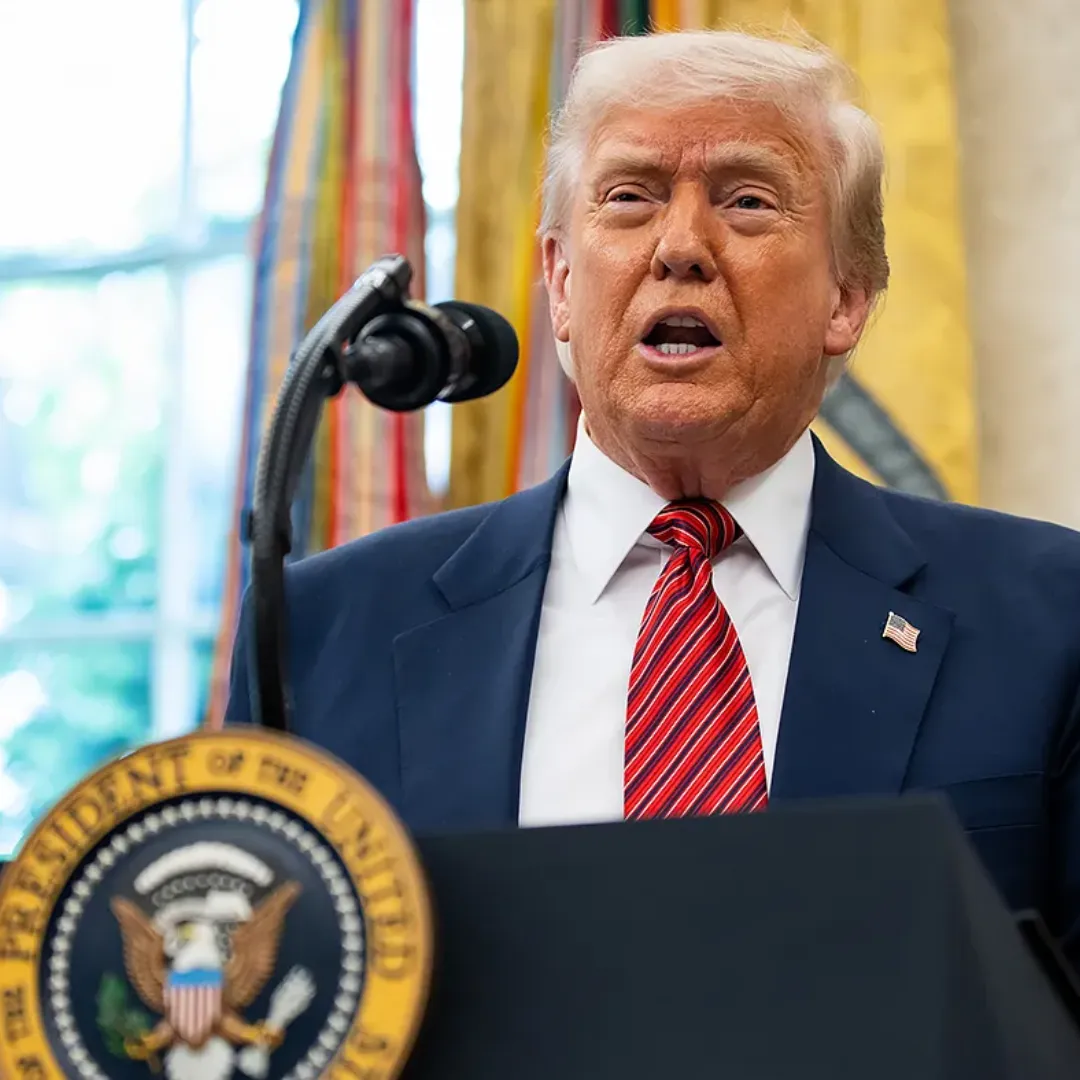
In a provocative and lengthy post on Truth Social, President Donald Trump suggested that Republicans in Congress should consider expelling Democratic lawmakers, particularly those involved in the ongoing impeachment discussions against him.
The president, in his characteristic combative style, denounced the Democrats as "out of control" and accused them of being radical leftists who are once again pursuing impeachment. He specifically targeted two lesser-known Democratic representatives who have been vocal in their calls for impeachment, labeling them as “whackjobs” and questioning their respectability within Congress.
Trump’s comments reflected his frustration with the impeachment push, which he views as an unwarranted attack on his presidency. He went on to accuse these Democrats of various alleged crimes, particularly related to election times, and suggested that Republicans should consider expelling them for their actions.
Trump's inflammatory rhetoric marked a stark escalation in his ongoing war of words with Democratic lawmakers, reflecting his increasingly antagonistic stance against his political opponents.
The president’s post also contained a broader criticism of Democrats, whom he described as “very dishonest people” who, in his view, are standing in the way of the country’s healing process. He accused them of hating the United States and everything it stands for, further intensifying the rhetoric surrounding the deep political divide in the country.
Trump's call to expel Democrats from Congress, while not backed by any official Republican leadership, was nonetheless a chilling reminder of his willingness to use aggressive tactics against his opponents. It also raised questions about the lengths to which he is willing to go to exact political retribution, especially in the wake of his controversial second impeachment and the ongoing investigations into his actions.
Despite Trump’s calls for retribution, the idea of impeaching him a third time has not gained widespread support within the Democratic Party. Key Democratic figures, including House Democratic Conference Chair Pete Aguilar and Senate Minority Leader Chuck Schumer, have expressed reluctance to pursue another impeachment, signaling that many within the party are not ready to take such a drastic step.
Aguilar, in particular, noted that impeachment is not an exercise Democrats are willing to undertake, highlighting the internal division within the party over the best course of action in holding Trump accountable. Schumer, too, echoed this sentiment, stating that impeachment is “too far away to even judge” as a viable option, especially given the other pressing issues facing the country.
This reluctance on the part of Democratic leadership is a significant contrast to the rhetoric espoused by Trump, who continues to view impeachment as an unjustified attack on his presidency and a politically motivated move by his adversaries.
The suggestion that Democrats could be expelled from Congress for alleged crimes is, at best, speculative and unfounded. There is no evidence to support Trump’s claim that any Democratic lawmaker has committed crimes related to the impeachment process or any other actions he specifically mentioned, such as the allegations against Rep.
Adam Schiff. These accusations are a continuation of Trump’s pattern of using social media to attack his political rivals, often without basis. Throughout his time in office and beyond, Trump has frequently targeted his political opponents with personal attacks, often casting them as criminals or enemies of the state.
His latest comments on Truth Social are just another example of his desire to portray Democrats as corrupt and unpatriotic, aiming to rally his base by positioning himself as a defender of the American people against a supposedly corrupt political establishment.
Trump’s rhetoric has always been sharp, but since returning to office, his words have increasingly been accompanied by actions aimed at seeking retribution against those he perceives as enemies. One such example is his ongoing campaign against the members of the January 6 Committee, whom he has accused of political bias.
After months of threatening to overturn preemptive pardons granted to members of the committee, Trump declared that the pardons given by President Joe Biden to those involved in the investigation were “void” and “vacant.”
This statement was another indication of Trump’s willingness to use his power to retaliate against those who have been involved in holding him accountable. While no members of Congress have yet been charged by the Trump administration, the administration’s increasing use of the justice system to pursue political foes suggests that this could be just the beginning of a broader campaign of retribution.

Trump’s administration has already made several high-profile moves that reflect this desire for retribution, particularly in the realm of immigration. Recently, the FBI arrested Milwaukee Judge Hannah Dugan, accusing her of obstructing the arrest of an undocumented migrant.
This move has raised concerns among civil rights groups, who argue that it is part of a broader pattern of using the justice system to target those who oppose the administration’s immigration policies.
Similarly, the administration has launched an investigation into Chris Krebs, the former director of the Cybersecurity and Infrastructure Security Agency, who became a target after he debunked Trump’s false claims of widespread election fraud. These actions signal a growing willingness on the part of Trump and his administration to use the full force of the government to punish those who stand in opposition to him.
Perhaps the most telling moment came when Tom Homan, Trump’s border czar, responded to a reporter’s question about why the administration didn’t just arrest leaders of sanctuary cities and states for “harboring and shielding illegal aliens.”
Homan’s cryptic response, “Wait and see what’s coming,” was widely interpreted as a veiled threat. His words suggested that the administration was preparing to take more aggressive actions against political opponents, especially those who support immigrant rights and sanctuary policies.
This rhetoric, combined with the actions already taken by the Trump administration, paints a troubling picture of how the president plans to wield his power in the coming months.
The rhetoric of retribution and the use of the justice system for political purposes raises serious questions about the future of American democracy and the checks and balances that are supposed to exist within the government.
Critics of Trump have long warned that his actions and statements could erode the democratic norms that have underpinned the country’s political system for centuries. The idea of expelling members of Congress based on perceived political vendettas is a troubling development that calls into question the integrity of the legislative process and the rule of law.
At the heart of Trump’s campaign against his political opponents is a desire to maintain control over the narrative and to retaliate against those who challenge his authority. By framing the impeachment efforts and legal challenges against him as part of a broader conspiracy by Democrats, Trump seeks to rally his base and portray himself as a victim of political persecution.
This victimhood narrative has been a central theme of Trump’s political identity, and it continues to resonate with his supporters, who see him as a champion fighting against a corrupt system.

However, as Trump continues to lash out at his political rivals, there is a growing sense that his tactics are alienating a broader segment of the electorate. While his base remains loyal, his constant attacks on the democratic process and his political opponents are beginning to raise concerns about the long-term implications of his leadership style.
The use of government power to target political adversaries, the rhetoric of retribution, and the undermining of democratic norms are dangerous signs for the future of the country’s political system.
Trump’s comments about expelling Democratic lawmakers from Congress, while largely symbolic at this stage, serve as a warning about the direction in which he is heading. The threat of using the justice system for political retribution, coupled with his continued efforts to rally his base by attacking his opponents, suggests that Trump is prepared to continue his confrontational approach to politics.
As the country moves further into the post-2024 era, the question remains whether Trump’s tactics will continue to be effective or whether the public will begin to demand a return to civility and accountability in politics. The consequences of his actions will have far-reaching implications for the future of American democracy.



